One of Our Aircraft is Missing
80 years ago a promising young outside left was lost over the Mediterranean at the height of WW2. Pete Jones tells his story through the letters his family have preserved and sets his loss against the pivotal period of the war
On 26 June 1940, Everton's first manager, Theo Kelly, wrote a letter. It was a reply to a Mr Teddy Regan of Saltney in Chester concerning a young outside-left on Everton's books called Alfred Penlington. We do not have the original letter but it is clear that Mr Regan was a big fan of young Penlington, perhaps unsurprisingly as he seems to have been Alfred’s older step-brother. Alfred was clearly a talented footballer for as a schoolboy he had a record of playing 89 games, scoring in 85 of them, and never finishing on the losing side.
Theo Kelly clearly shared Mr Regan's view of Alfred, writing:
Dear Teddy,
Many thanks for your letter of the 18th inst.
Your opinion of Penlington is no higher than my own, and in fact everyone who has seen him play with us, is agreed as to his ability. I don't know if you would remember Geroge Harrison, who came to us from Leicester many years ago. Strangely enough he was an outside-left, and young Pen is the image of him on and off the field......
The comparison with George “Jud” Harrison (not Geroge, as Theo Kelly's secretary, or maybe Theo himself typed it) was praise indeed. Harrison played either side of WW1 and was a Championship winner with Everton in 1914-15. He was an England international, as well as serving with – and playing for – the Scots Guards alongside his Everton teammates Sam Chedgzoy and Billy Kirsopp in WW1. The comparison with young Pen may have been bittersweet, as George Harrison had taken his own life just over a year before.
Theo Kelly continued:
It is possible that we will not take part in competitive football next Season, but I have safeguarded his interests here, by registering him with the football league. This will save anyone tapping him until the war is over and we can offer him terms. It will not prevent him playing as amateur for his own Club, or a Football League Club, provided they get permission from me. This will readily be granted if necessary, but will mean that we know where he is........
Theo Kelly is a controversial figure in Everton history whose autocratic and abrasive manner led to him falling out with most of the club's great names during his period in charge. He ended Bill Dean's career at Everton, fell out with and sold Joe Mercer to Arsenal, tried to sell T G Jones to A S Roma and failed to hold on to Tommy Lawton.
The decline of Everton after WW2 was in no small part due to Kelly's decisions. However, as Rob Sawyer has shown, Kelly was a fine administrator who was responsible for keeping Everton afloat during the war years. Harry Catterick for one learned a lot from Theo Kelly. He was also a champion of homegrown talent as the conclusion of his letter to Mr Regan suggests:
You can tell Pen what I say if you wish, and I am certain that he has got a great future as a player.
Kind regards,
Yours sincerely,
Theo Kelly.
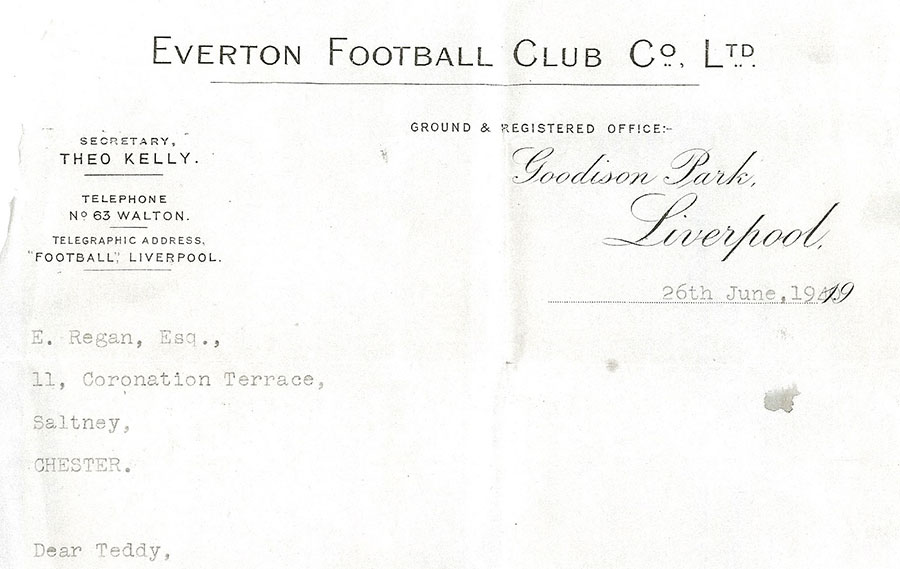
The header of Theo Kelly’s letter. Courtesy of the Penlington family
Theo Kelly's uncertainty about the following season expressed in the letter may have been due to events elsewhere. The previous day, 25 June 1940 saw the armistice between France and Germany come into effect. The combined British, Belgian, Dutch and French forces had been defeated on the continent in just six weeks, leaving Britain standing alone against Germany. Suddenly, the war, dubbed 'phoney' less than 2 months before, was very real.
Two months later, on 27 August 1940, a postcard arrived at the Penlington family home in Chester. It was from Goodison Park and was a pre-printed notification of selection for the Everton first team. In the section for opponents, "Manchester City" was handwritten, and after 'on Saturday next' the date "August 31st" was written in. 'Coach leaves' was followed by the words "Goodison Park" in handwriting which may have been Theo Kelly's own. The time of departure was 1 pm for a 3 pm kick-off; the game was staged as a wartime Northern League fixture.
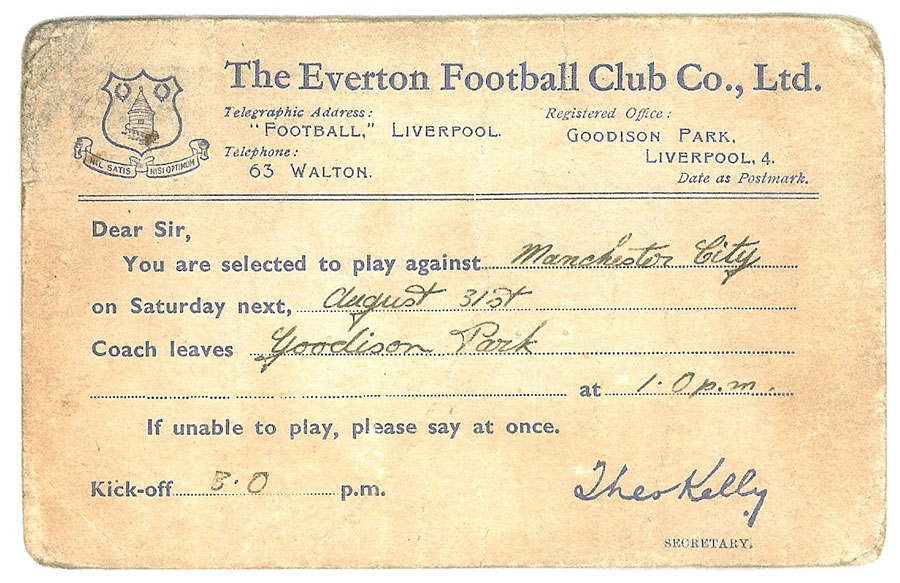
The first team selection postcard. Courtesy of the Penlington family
Although young Pen must have been excited at his upcoming first-team debut, elsewhere events were reaching a crisis. The German bombing of Britain which became known as the Battle of Britain had entered its main phase, called by the Luftwaffe – Alderangriff - Eagle attack on 13 August. This took the form of mass daylight raids on the RAF in the Southeast while night raids were mounted on the industrial Midlands and the North.
The night after the arrival of the postcard, Merseyside suffered the first air raid by the Luftwaffe when 160 bombers attacked both sides of the Mersey, targeting the docks. Further raids took place on the following two nights. It was against this backdrop that the Everton players boarded the coach on the last day of August; they were a stellar group and included many of the men who had won the last peacetime Championship.
Alfred Penlington was joined by a young reserve right-winger called William Sumner; maybe they sat together or possibly some of the senior pros took the two youngsters under their wing. However, Pen and Sumner were not that much younger than some of the men with Championship medals; Tommy Lawton being still only 20.
The team that day was Sagar (captain), Cook, Greenhalgh, Mercer, Jones (TG), Watson, Sumner, Bentham, Lawton, Stevenson and Penlington. The Man City team included the great Frank Swift in goal and the two teams fought out a 0-0 draw in front of 5,000 spectators. For players and fans, it would have been a welcome diversion from the war and the threat of a German invasion. The Echo reported that “Penlington and Sumner were opposed by international defenders, and were overawed. Nevertheless, I liked the play of Penlington. He will come on”.
A week after his debut at Manchester City, Alfred was selected in the same team for the return fixture at Goodison Park, Everton winning by a 35th-minute goal from Tommy Lawton. He would make one more appearance in a wartime game, on 26 October against Bury at Goodison. He was again on the winning side as goals from Bentham, Lawton and Stevenson gave the Blues a 3-1 win. The match reports were complimentary about Alfred’s play with one describing him as “a fighting footballer despite his tender years”.
By this time, the Battle of Britain had been won and any threat of invasion, never really feasible with hindsight, had receded. However, the longer nights saw the Luftwaffe keep up its bombing campaign; 50 raids on Merseyside took place in the last 3 months of 1940. These culminated in a series of heavy raids in Christmas week 1940. The Penlington family home in Chester were far less affected by air raids, only three people were killed by air action in the whole of the war. This was despite the Penlingtons living near to the new aircraft factory at Broughton which assembled Wellington bombers.
For Alfred Penlington, the excitement of playing for Everton would have run parallel to his intent to do his bit for the war effort, as was said at the time. We do not know anything for certain as Alfred’s service record is only available to his immediate family, but it is likely that he had already joined the RAF Volunteer Reserve which was the standard route into the air force, indeed this may have prompted Teddy Regan’s letter to Theo Kelly.
Young Pen would continue to work for a Chester light engineering firm while awaiting his call-up. However, Alfred would have to perform a sombre task, helping carry his elder brother Joseph’s coffin to its final resting place in Chester. Joseph was serving in the RAF with an anti-aircraft balloon detachment when he died of illness on 1 April 1941 aged just 23.
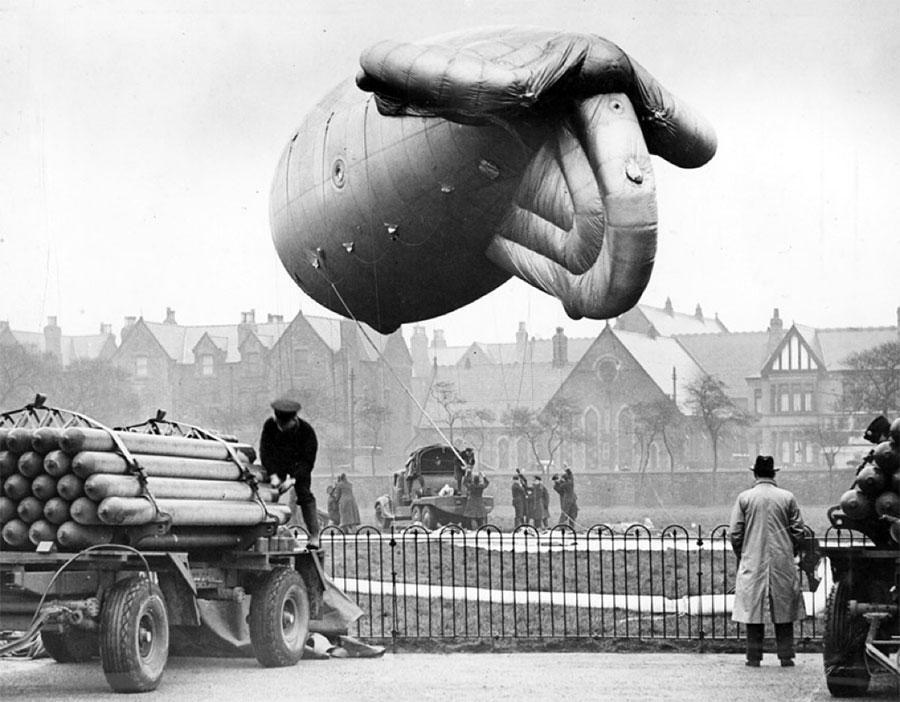
An anti-aircraft balloon being readied in a Liverpool park (rafmuseum .co.uk)
Joseph’s death came against a background of the relentless and often desperate Battle of the Atlantic against the German U-Boat menace, run from central Liverpool, and the devastating May Blitz on Merseyside. The key events of 1941 further afield saw the onset of Operation Barbarossa, the gigantic German invasion of Russia and the entry of Japan into the war with the surprise attack on Pearl Harbour on Sunday 7 December. Alongside this, Commonwealth forces were engaged in a see-saw campaign back and forth along the Mediterranean coast of North Africa against Italian forces, strengthened by a small but highly effective German presence led by Erwin Rommel.
Alfred’s call-up papers arrived in December 1941 and he was sent to be trained as an air gunner. By the time young Pen swapped the blue of Everton for the lighter blue of the RAF, the worst of the bombing was over for Merseyside; the May Blitz being the peak of the Luftwaffe’s efforts. The last raid on Liverpool took place on 10 January 1942; ironically one of the buildings destroyed, 102 Upper Stanhope Street in Toxteth, had been the home of Adolf Hitler’s half-brother Alois. The bombing of Merseyside killed 2,716 people in Liverpool, 442 people in Birkenhead, 409 people in Bootle and 332 people in Wallasey; this was the worst death toll outside London.
For Alfred Penlington, there is a 14-month gap without any information about his whereabouts including the whole of 1942, the pivotal year of the war. The tide seemed to be running against the Allies nearly everywhere in the first part of the year and beyond on some fronts, but gradually the tide turned.
At sea, the grim unremitting struggle against the U-boats continued throughout the year and, in the Far East, the Japanese followed up their attack on Pearl Harbour by seizing the southeast Asian colonies of Britain, France and the Netherlands. They also took many of the islands that dotted the southwest Pacific, came within bombing range of northern Australia, and reached the borders of India. Their advances in the Pacific were stemmed when they attempted to seize Midway Island and lost four of their main fleet aircraft carriers over four days between 4 and 7 June.
Closer to home, the RAF gathered every aircraft that could reach Germany and mounted three 1,000 bomber raids on Cologne, Essen and Bremen, the first on the night of 30 May. It was an attempt to swamp the German defences and was a major morale boost to a country becoming weary with setback after setback.
However, the bad news continued to pile up from Russia and North Africa. The Germans struck southeast on 28 June towards the Russian oilfields of the Caucuses area to deny their opponents fuel and replenish their own diminishing supplies. They made rapid progress crossing the Don River near Stalingrad in less than a month. Progress slowed as they approached the Volga but by late August they were fighting in Stalingrad itself. To the south, the long supply lines and growing resistance stopped the advance just short of the main oilfields.
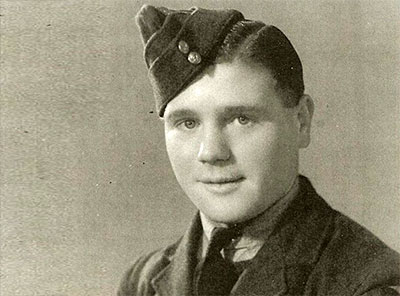
Alfred, probably taken for the award of his air gunner wings and promotion to sergeant. Courtesy of the Penlington family
In North Africa, the British and Commonwealth forces were driven back to the borders of Egypt by Rommel’s troops, losing the port of Tobruk on 21 June. There appeared a real prospect that the enemy might break through in Egypt and the Caucasus, force the Soviet Union out of the war, and threaten the oilfields of the Middle East. It even seemed possible that the Germans and Italians could link up with the Japanese and threaten India; this prompted a political crisis which Prime Minister Winston Churchill only just survived.
However, the recurrent problem of overextended supply lines halted the Italians and Germans after their attacks near an insignificant railway halt called El Alamein during July were unsuccessful. Having been reinforced, Rommel attacked again to the south of El Alamein at Alam el Halfa at the end of August but was again repulsed.
Having built up their strength in Egypt, the 8th Army went on the attack at El Alamein on 23 October and ground the Italians and Germans down in gruelling and brutal fighting until they were forced to retreat on 11 November. Three days before, US and British troops had landed along the Vichy French North African coast far to the west in Operation Torch. They began to move east to try and cut off the Germans and Italians from the rear.
Eight days later, the Russians mounted a massive counter-attack called Operation Uranus either side of Stalingrad. This smashed through weak Romanian forces holding the hinges of the salient that the Germans trying to take the city had been sucked into. Over 250,000 troops were trapped when the encirclement was completed on 23 November. Hitler ordered the besieged troops to stay put and be supplied from the air, but this proved one of his many errors and the army in Stalingrad would surrender at the beginning of February 1943.
Suddenly, in November 1942, the tide turned for the Allies. Hitler would make another strategic error by reinforcing his armies in North Africa in a desperate attempt to hold on in the face of Allied forces advancing from east and west. It would be here that Alfred Penlington would make his contribution.
He reappears in the available records on 21 January 1943 when the Liverpool Evening Express printed a story that Everton FC had received information that Alfred Penlington had been killed in action. The story was incorrect and nothing appears in Everton’s admittedly brief wartime records about it, or indeed anything about young Pen at all.
The effect on Alfred’s parents can only be guessed at but they were able to inform the paper of the error. An update headed “Everton Forward: Good News” was printed in the 3 February edition. Two weeks later, on 26 February 1943, Alfred Penlington wrote a letter home to 49 Cliveden Road in Chester.
Dear Mam & Dad
Sorry about the delay in writing knowing that you will understand by the changing of my address. I sent a cable two days ago. I am still with Harry & better still we are both going to fly with Alan Crombie our old pilot. We both left A/U Wednesday night & met Alan last night. Alan sends his regards & best wishes to all at home. I did not receive Edwards letter I expect I will not get any for many weeks worst luck. Give my love and best wishes to everyone. Hoping you Mam and Dad are both well, I am as usual in the pink…..
The letter was written on a Military Airgraph Service form. The form would be photographed and added to a roll of microfilm to be developed back in the UK. The sender information was Sgt A. Penlington and what looks like his service number along with 203 Squadron RAF ME. ME presumably stands for Mediterranean, as 203 Squadron were based in Egypt. They were equipped with modern US made Martin Baltimore light bombers which had a twin machine-gun turret for defence which was presumably Alfred’s position as air gunner.
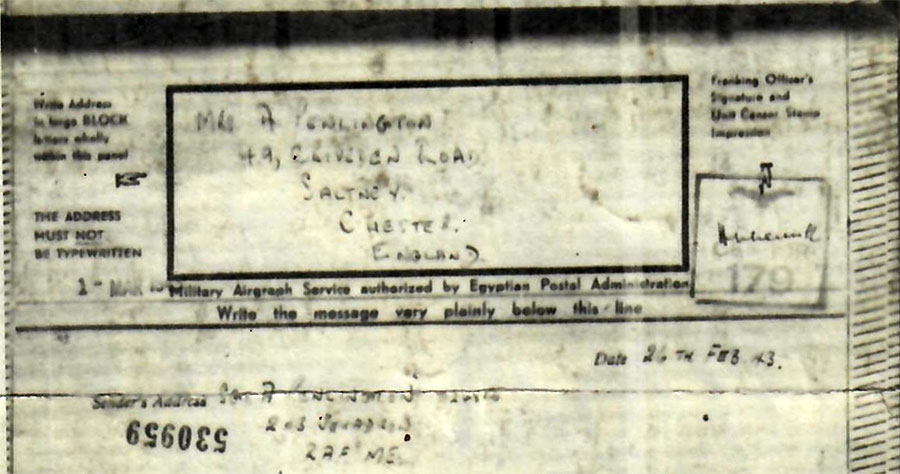
The header of Alfred's letter home. Courtesy of the Penlington family
However, the excitement of flying with his mates was short-lived; soon after he wrote the letter, he was reassigned to 221 Squadron, flying Wellington medium bombers from the besieged island of Malta. 221 Squadron specialised in seaborne operations and earlier in the war had patrolled the western approaches to the UK, seeking out German U-Boats from Northern Ireland. They developed tactics to identify U-Boats on the surface at night with radar, illuminating them with flares and then bombing them.
They had a short posting to Iceland during late 1941 before swapping the Atlantic for the Mediterranean, arriving in Egypt in the first week of January 1942. Their Wellingtons were converted to carry two torpedoes and their submarine hunting tactics were adapted to attack Italian merchant ships sailing by night to supply the North African forces through the Libyan ports of Tripoli and Benghazi.
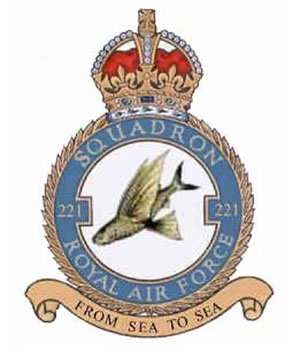
The badge of 221 Squadron RAF (rafweb.org)
RAF attacks on the supply convoys were key to keeping the German and Italian forces in a constant supply crisis and eventually trapping them in Tunisia, but the cost was high. From their arrival in Egypt to 21 January 1943, when they relocated to the much battered RAF Luqa aerodrome on Malta, they lost 21 airmen killed. From that date to the German and Italian surrender on 13 May, they lost another 58. One of them was Alfred Penlington.
On the evening of 18 April 1943, Wellington Mk X, serial number HX487, took off from Luqa, Malta at 21:30 for an anti-shipping mission to Marettimo Island, west of Sicily, with Sgt Alfred Penlington as one of the six-man crew. It was piloted by Squadron Leader Mike Foulis who had been awarded the Distinguished Flying Cross twice and another of Alfred’s crewmates had been awarded the DFC. The aircraft failed to return and was reported missing. Another 221 Squadron Wellington was also lost that night making it the worst loss for the squadron in the Mediterranean campaign.
Also patrolling the 80-mile gap between Marettimo Island and Cap Bon on the Tunisian coast that night was a young German pilot called Heinz Rökker, flying a Junkers JU88 heavy night fighter equipped with radar. At around 01:15 on 19 April, he shot down a Wellington near Marettimo; it was almost certainly one of the two 221 Squadron aircraft and therefore possibly Alfred’s.
Rökker was also 23 years old, having been born just five days before young Pen. His night fighter unit had recently returned to the Mediterranean from Belgium, having been recalled to meet the growing challenge of RAF raids on Germany. It was a sign of how stretched the German war effort was becoming. It would be his sixth aircraft shot down and the last flying from Sicily; Rökker returned to Germany soon after and would take his total to 64 by the end of the war. He survived and lived until 2018, passing away aged 97.
Amongst the memorabilia that the Penlington family keep in memory of Alfred, there is unsurprisingly nothing to point to when they were informed that he was missing. The family must have endured a nightmare period hoping against hope that he would be reported alive through the Swiss Red Cross. The last letter they have indicates that several months might have elapsed before young Pen was finally confirmed as lost. It is dated 30 November 1943 and came from Buckingham Palace.
Dear Mr Penlington,
The King and Queen have heard with sincere regret that your son, Sergeant Alfred Penlington has lost his life in the service of his country, as his brother, Aircraftsman Joseph Francis Penlington did. I am desired by Their Majesties to assure you of their deepest sympathy in this double loss that you have sustained.
It is short and slightly old fashioned in tone but poignant nonetheless, and is signed by King George VI’s private secretary Sir Alan Lascelles. I find it impossible to imagine the pain that the Penlington family must have gone through in that period.
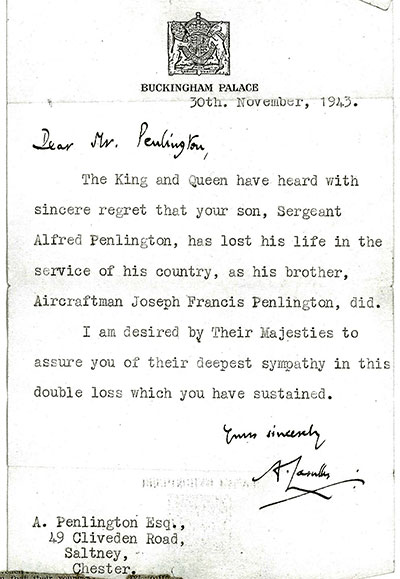
The letter from Buckingham Palace. Courtesy of the Penlington family
Less than a month after the loss of Alfred Penlington, the Germans and Italians surrendered in Tunisia, bringing the North African campaign to an end. Between 250,000 and 300,000 troops became prisoners, including most of the battle-hardened German Afrika Corps and the best Italian divisions. Together with the catastrophic losses suffered on the Eastern Front, it was a body blow for the Germans. It was in no small part thanks to the bravery and skill of the RAF and men like young Pen.
We should never forget how much we owe them.
Postscript
I am indebted to Eddie Penlington and his friend, Damien Molloy, for drawing Alfred’s story to the attention of Everton FC and via the Everton FC Heritage Society, to me. Eddie and his family were guests at one of the Remembrance Services organised by the Society and I was particularly happy to meet Eddie’s aunt Maureen who remembered Alfred from before the war. It is to them that I would like to dedicate this piece. They were kind enough to lend me the memorabilia they had for Alfred including the letters and several newspaper cuttings and since then I’ve been researching Alfred trying to fill in the many gaps in his story with mixed success.
In 1954, an impressive memorial was erected in the Floriana area of Valetta on Malta to honour the memory of the 2,298 RAF personnel killed in the Mediterranean theatre during WW2 and I am lucky to have had two of my friends visit the memorial to seek out Alfred Penlington’s name.
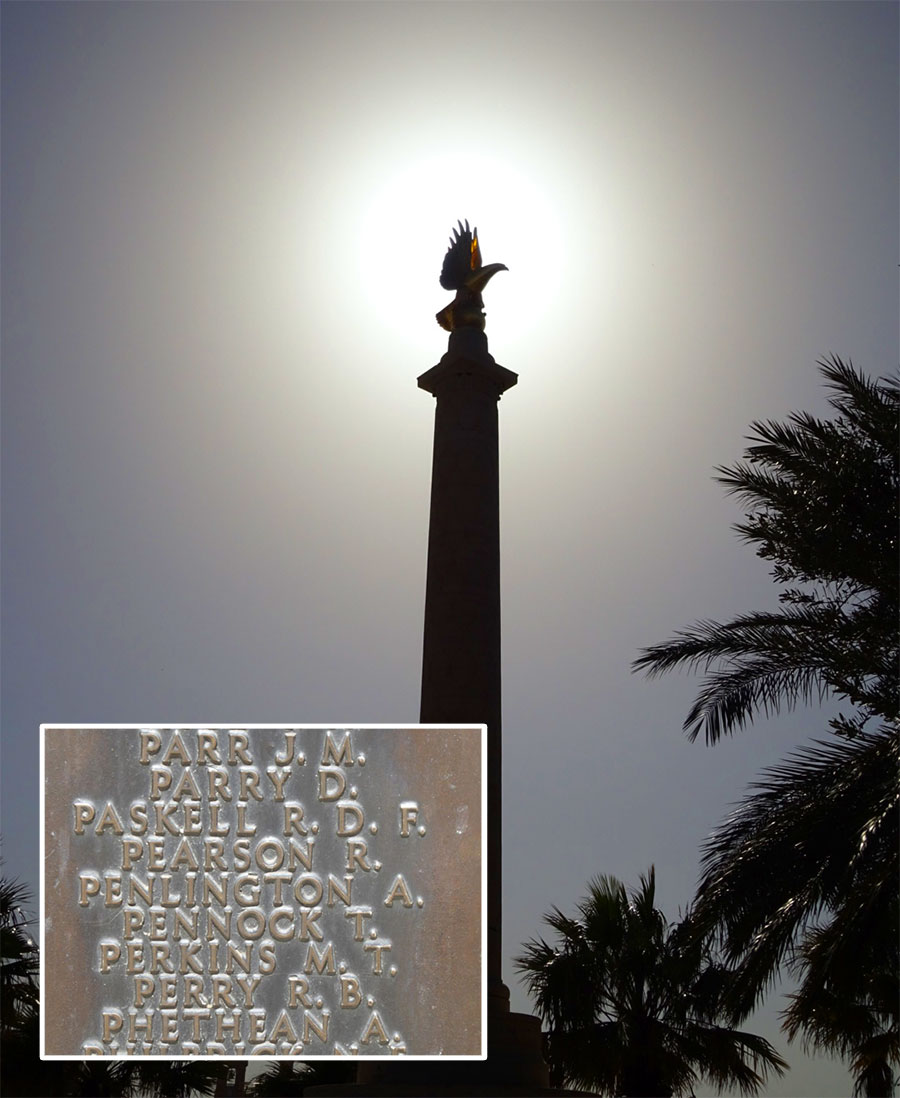
The Floriana Memorial (Jeff Cox); Inset: Alfred’s name on the Memorial (Professor Jim Storr)
I’ve managed to find some new information, but there are still a lot of gaps, contradictions and unanswered questions. However, as the 80th anniversary of his loss approached, I decided that the story should be told regardless as his sacrifice should be honoured. Equally, the priceless items that the family shared with me are too evocative to stay in the envelope or in my computer files.
I hope you find them as moving as I do.
Pete Jones.
Acknowledgments
Jeff Cox
Alison Jones
J P Levinge
Mike Royden
Professor Jim Storr
Billy Smith
Copyright Pete Jones 2023.
Reader Comments (11)
Note: the following content is not moderated or vetted by the site owners at the time of submission. Comments are the responsibility of the poster. Disclaimer ()
2 Posted 24/04/2023 at 17:46:47
Lest we forget.
3 Posted 24/04/2023 at 18:27:22
At the going down of the sun and in the morning, We will remember them.
RIP Albert and Joseph.
4 Posted 24/04/2023 at 18:47:19
that was excellent, as sad is the topic. It almost felt like a time of war. Thanks.
5 Posted 25/04/2023 at 17:46:46
6 Posted 25/04/2023 at 18:42:55
7 Posted 25/04/2023 at 18:48:14
This is of interest as I lost both my parents 18 months ago, and the things they saw as young children are a different world to the one we have now.
8 Posted 27/04/2023 at 13:25:05
9 Posted 20/06/2023 at 08:11:22
A wonderful tribute to Sergeant Penlington.
10 Posted 20/06/2023 at 08:37:46
I managed to help create a special tribute to him in the Para website – there were so many true heroes who never ever talked about their experiences, but we need to make sure they are never forgotten...
https://www.paradata.org.uk/people/bryan-g-quinn
Keep those stories coming, Pete...
11 Posted 29/06/2023 at 20:08:09
Just as a postscript, Eddie, Alfred's great-nephew said he and the family were really happy with the article which was the most important thing for me.
By lucky coincidence, a friend among the WW1 research community happened to be visiting Malta and when I mentioned Alfred she made her way to the memorial where he is remembered and paid her respects on my behalf.
The following day she attended a short memorial service at the RAF chapel in Valetta and had Alfred's name read out 80 years to the day that he was lost. Thanks again, Jane.
Add Your Comments
In order to post a comment, you need to be logged in as a registered user of the site.
Or Sign up as a ToffeeWeb Member — it's free, takes just a few minutes and will allow you to post your comments on articles and Talking Points submissions across the site.
How to get rid of these ads and support TW








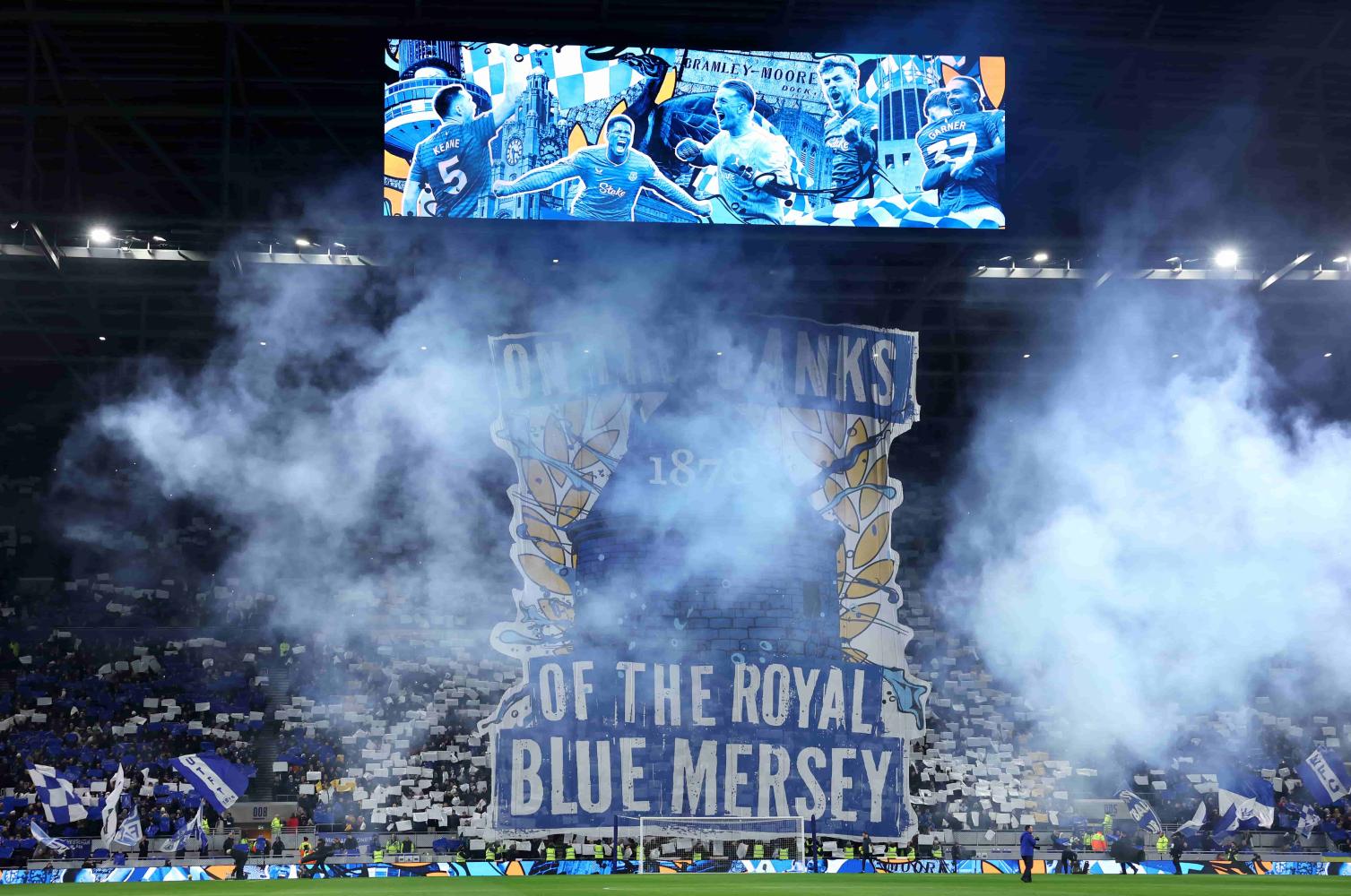


1 Posted 24/04/2023 at 17:41:41